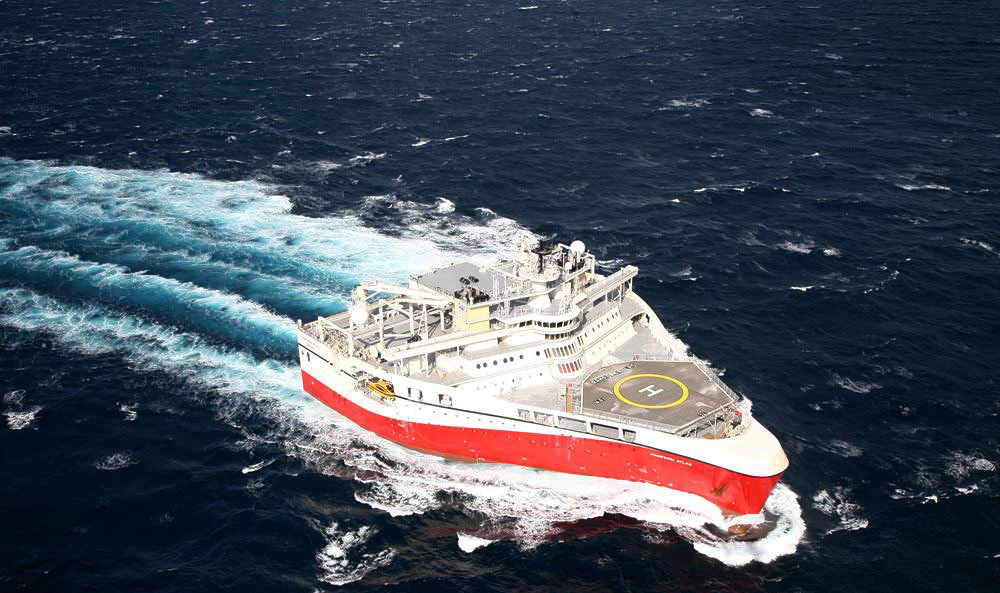Civil society organisations The Green Connection and Natural Justice will square off against oil giant TotalEnergies and the South African government in the Western Cape High Court from Monday, in a legal challenge over offshore oil and gas exploration rights granted along the country’s sensitive southern coastline.
The case, set down for hearing from 5 to 7 May 2025, centres on the Department of Forestry, Fisheries and the Environment’s 2023 decision to grant environmental authorisation to TotalEnergies EP South Africa Block 567 (Pty) Ltd (Teepsa) for seismic survey and exploration drilling activities in Blocks 5/6/7, an expanse stretching between Cape Town and Cape Agulhas.
 Searcher Geodata’s seismic survey ship Ramform Atlas. (Photo: Supplied by Searcher)
Searcher Geodata’s seismic survey ship Ramform Atlas. (Photo: Supplied by Searcher)
The applicants, The Green Connection and Natural Justice, represented by Cullinan & Associates, argue that the State’s decision-making process in granting the environmental authorisation was flawed, rushed, and failed to uphold constitutional and environmental obligations.
Most crucially, the applicants question the environmental authorisation process and challenge the government’s alleged failure to properly assess the significant risks posed by oil and gas exploration, including oil spills, climate change impacts and threats to small-scale fishers’ livelihoods.
The state and Teepsa, meanwhile, maintain that the authorisation was lawful, transparent, and strictly limited to exploration, not production.
Below, we further unpack key aspects in the heads of arguments by both the applicants and the respondents, which will be heard this week in court.
Read more: Legal battle brews over TotalEnergies’ offshore oil and gas drilling in Western Cape
Timeline of events
In May 2024, the applicants first applied for judicial review with the Western Cape High Court, challenging the decision to grant environmental authorisation to TotalEnergies.
The environmental authorisation was granted by the Director-General: Mineral Resources and Energy in April 2023, and confirmed by the Environment Minister’s dismissal of 18 appeals against the DG’s decision.
In July 2024, TotalEnergies withdrew from the offshore exploration block 5/6/7. But Total still holds a 40% interest in the block. The exit raised questions about the future of the block and potential shifts in investment or operational responsibilities among the remaining stakeholders.
But TotalEnergies has now filed a joinder application to include Shell as a party in these legal proceedings, because Shell is a joint holder of the exploration rights and current Operator of the Joint Venture, and is expected to become the holder of the contested environmental authorisation.
The Green Connection and Natural Justice are opposing this move, arguing that the exploration right has lapsed and that Shell has no legal standing in the case.
Was environmental authorisation granted unlawfully?
The case being brought is an application to review and set aside an environmental authorisation granted to TotalEnergies by the environment minister, the mineral resources and energy minister and the department’s director-general.
The environmental authorisation permits TotalEnergies to conduct exploratory drilling for fossil fuels off the southwest coast of South Africa.
The Green Connection and Natural Justice both participated in the process, which led to the granting of the environmental authorisation, and now contend that the Environmental Impact Assessment (EIA) process lacked procedural fairness and failed to adequately consult affected coastal communities, including small-scale fishers.
The applicants argue that the decision to grant TotalEnergies the environmental authorisation was unlawful and irrational in six key respects:
- The final Environmental Impact Report (EIR) did not properly assess how a well blowout or oil spill could affect small-scale and commercial fishers, especially in terms of livelihoods, food security and cultural heritage.
- The decision-makers did not comply with the requirements of the Integrated Coastal Management Act, which mandates consideration of how coastal activities affect public access, the coastal environment and customary users.
- The EIA failed to assess how any future fossil fuel production and burning of discovered gas would contribute to climate change, a legally required component of assessing the “need and desirability” of the project under the National Environmental Management Act (Nema).
- The authorities did not assess or meaningfully consider the potential impacts of the proposed project on Namibian waters, the high seas, or shared marine ecosystems, allegedly breaching both South African and international law.
- The Oil Spill Contingency Plan and Blowout Contingency Plan were not included in the Environmental Management Programme, nor subjected to public participation, which the applicants say is unlawful.
- The Petroleum Agency of South Africa (Pasa) submitted the Appeal Response Report, but the applicants argue this should have come from the competent authority (the DG) and that Pasa’s involvement compromised the appeal process.
In its heads of argument, the state insists the authorisation was lawful, transparent and strictly limited to exploration, not production. The state highlights that South Africa has drilled 358 offshore wells since the 1940s without a single major oil spill or blowout.
It says the country has comprehensive legal frameworks, disaster management plans and financial provisions in place to manage and mitigate environmental risks from oil and gas activities.
“Nema mandates Teepsa to take reasonable measures to contain oil spills, clean up, remedy effects, and assess impacts on the environment and public health,” reads the state’s heads of argument.
Further, the state argues that the EIA and authorisation cover only exploration. If commercially viable reserves are found, it argues that a completely new EIA and authorisation process will be required for production, with fresh public consultation and scientific studies.
Climate contradictions
The applicants also argue that the project violates South Africa’s constitutional obligations under section 24, the right to an environment not harmful to health or wellbeing, as well as the state’s duties under Nema.
Their heads of argument state that the project undermines the country’s international climate commitments under the Paris Agreement, and that any expansion of fossil fuel infrastructure in this “critical decade” of climate action is unjustifiable.
In response, the state rejected claims of bias or predetermined outcomes, insisting that relevant risks and alternatives were indeed considered and that mitigation measures were imposed on Teepsa.
The State’s legal team maintains that the EIA process satisfied all legal requirements under Nema and associated regulations, and that there is no blanket prohibition on fossil fuel exploration in South Africa, even in the context of climate change.
TotalEnergies: No imminent harm, only exploration
Teepsa’s legal counsel echoes the state’s arguments and adds that the applicants have not demonstrated any clear or immediate environmental harm from the proposed activities.
It frames the challenge as speculative, and adds that the activities in question are limited to exploration and do not authorise extraction or commercial development.
Teepsa insists that the risk of oil spills is low and manageable, and that the economic benefits, such as job creation and energy security, justify the project.
As the court hears the arguments this week, the case marks a critical juncture in South Africa’s energy and environmental governance. What unfolds could reshape how South Africa navigates fossil fuel exploration in a time of deepening climate crisis and growing calls for a just transition. DM




 Searcher Geodata’s seismic survey ship Ramform Atlas. (Photo: Supplied by Searcher)
Searcher Geodata’s seismic survey ship Ramform Atlas. (Photo: Supplied by Searcher) 